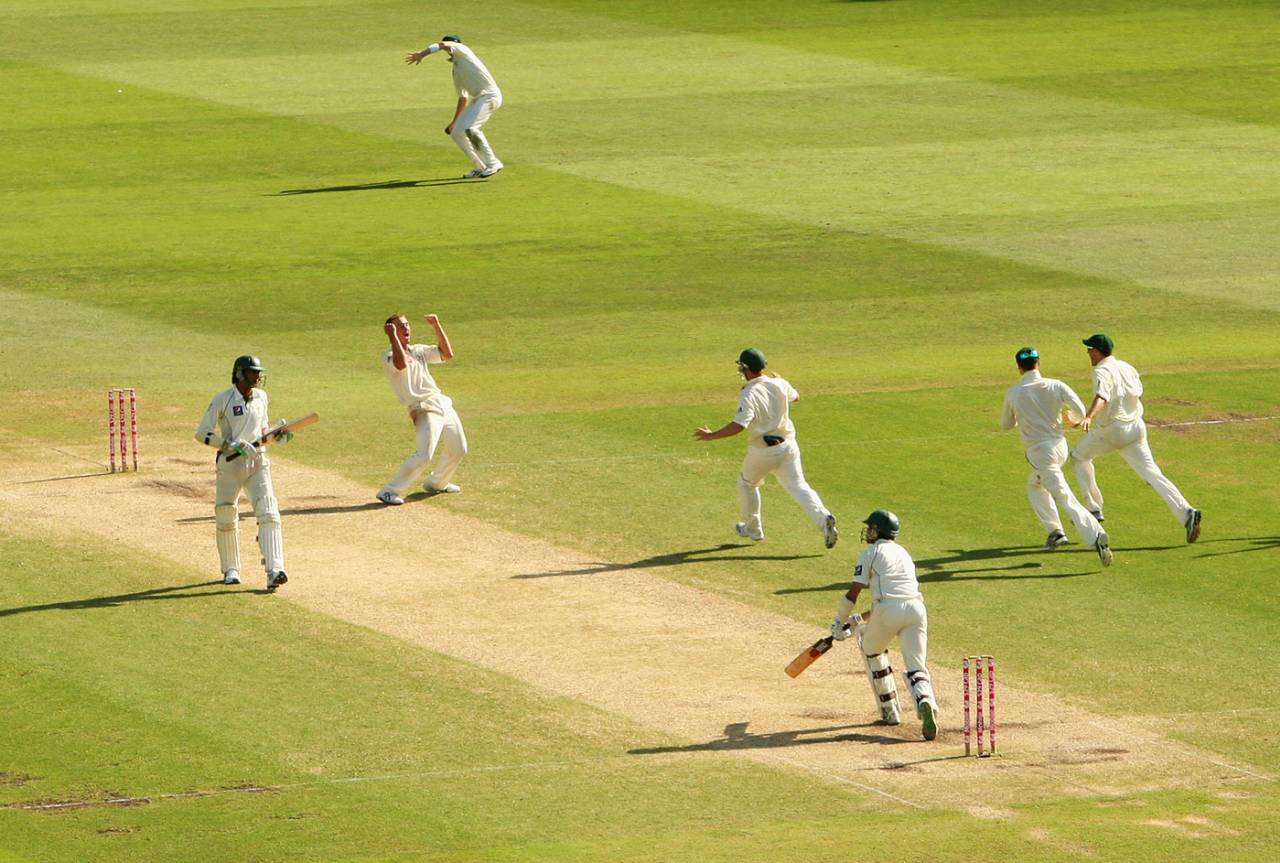The pitch may not have been a "Bunsen" but it was still a fifth-day Asian wicket. The target was over 300. Pakistan had less than two sessions. Against them was Rangana Herath - once the scourge of Pakistan (and only Pakistan, a la Nuwan Kulasekara), but now the best fingerspinner in the world. And Pakistan still
got home.
It went against history but more than anything it went against the team's character. For all the bravado, false or otherwise, that Pakistan's cricketers possess, their team has never been good at chasing. Only
seven times in their history have Pakistan won by scoring more than 200 in the fourth innings. Only one of those instances was between 1984 and 2002 - or to put it another way, the greatest teams in the country's history only once managed what
Misbah-ul-Haq's side pulled off against Sri Lanka last month.
The current players may have been brought up hearing
stories of their predecessors' run chases and they may have grown up understanding the
Maghrib chase like the back of their hands, but Pakistan are not a chasing team.
I know this may sound like Chris Rock repeating the same line over and over, but Pakistan don't chase well. The dread Pakistanis experience when chasing is as bad as what South Africans seem to go through in knockout one-dayers. Actually it might be worse, since the Proteas are at least consistent. Pakistan's cricket teams have scarred two generations of fans, ensuring that they never accept that their team could be anything but terrible at chasing.
Every sports fan has the miracle he believes in. For Pakistanis it has always been their bowling. Always. Pakistan's haal - a term that refers to a state of ecstasy - exists because the players, and the fans, believe in comebacks. But nearly always that haal is brought about with the ball in hand. There may have been the rare Abdul Razzaq innings (or the even rarer Shahid Afridi cameo), but those are as common as the giant panda. Mostly the memories of batting last bring forth a listing of failures.
This is because chasing requires competence, consistency and calmness - qualities most lacking even in the best Pakistani cricketers. Inzamam-ul-Haq is Pakistan's greatest chaser in the post-Miandad era, and Younis Khan is one of the great
fourth-innings batsmen, and those were the two who bucked the trend. Beyond them most Pakistani batsmen mastered only the art of looking like a deer in the headlights.
In January, 2010, Pakistan lost a Test match to Australia
in Sydney. The most common Facebook status on that day, an iteration of which even my brother put up, was: "Why do I still care about this lot?" It's a question all Pakistanis ask themselves after such heartbreaks.
Why does the failure of a bunch of adults playing a game, connected to you only by an accident of birth and the drawing of man-made boundaries, affect your mood, your day, your week? You ask yourself this, hoping that this might be the catalyst to you taking a
Seinfeldian approach towards sport. Every wicket falling is like a piece of your soul shredding away, until - like at the end of the Sydney Test - you are just a husk, questioning the point of your existence. Thus the lone saviours, the Miandads and Inzis, are praised to the roof, for these are competent men in the land of incompetence.
And that is why the third Test in Sharjah was so weird. Sure, Sri Lanka made mistakes - led by Angelo Mathews' refusal to stick with the logical. But Pakistan didn't make mistakes. And that was the oddest aspect. Pakistan went for the win from the first over - an obvious decision, considering they were 1-0 down, but better Pakistani teams have settled for less. And they didn't relent even when their openers fell. The promotion of Sarfraz Ahmed was bold - a nod to his form, and his willingness to go for it - but the move was also ensconced in the knowledge that, if he failed, Misbah would be there to shut shop if need be. After Sarfraz fell, Pakistan could still have fallen by the wayside. Instead Misbah and Azhar Ali, the embodiment of tuk-tuk, went at over five an over.
This chase could change both the players and the fans. Pakistan have a better win-loss ratio
batting second than
batting first in ODIs under Misbah (against the other teams in the top eight), but you would be hard-pressed to find a single Pakistani fan who would want the team to bowl first after winning the toss. This despite the fact that the two best ODI batsmen Pakistan have had in the last few years -
Misbah and
Umar Akmal - have a significantly better record when chasing than setting up totals.
But this doesn't mean Pakistan are a chasing team. The Pakistani captain prefers to bat second, yet he is defined by his failure to deliver successfully when under the spotlight. The most significant memories from ODIs when Pakistan under Misbah have chased might be the loss in the
third ODI to India in January 2013, or the loss in the
first ODI to South Africa last October - two classic Pakistani chases. How one "feels" when Pakistan bat second is more important than the numbers, after all.
